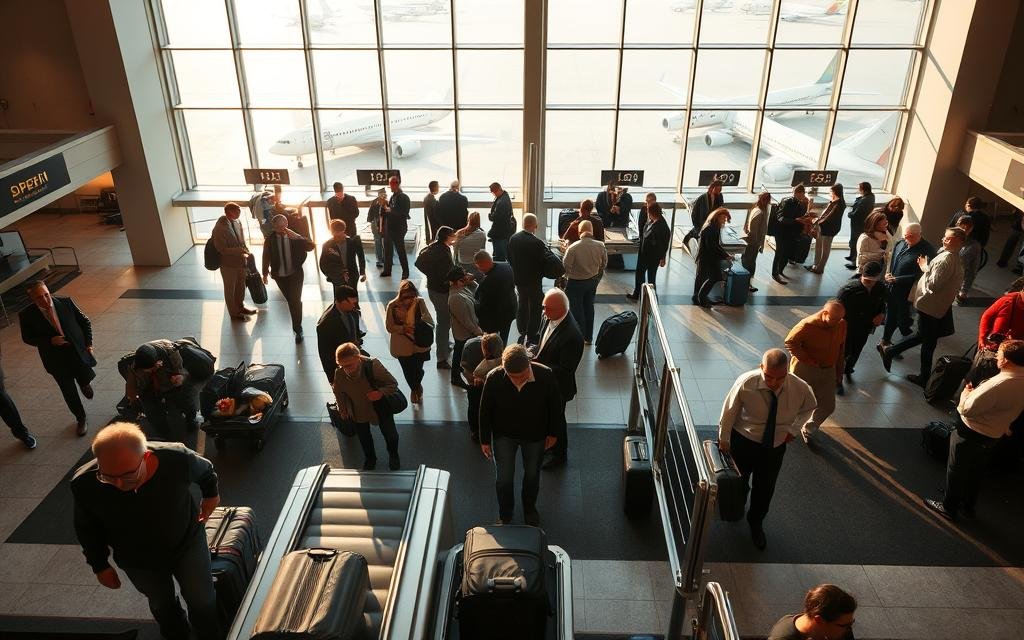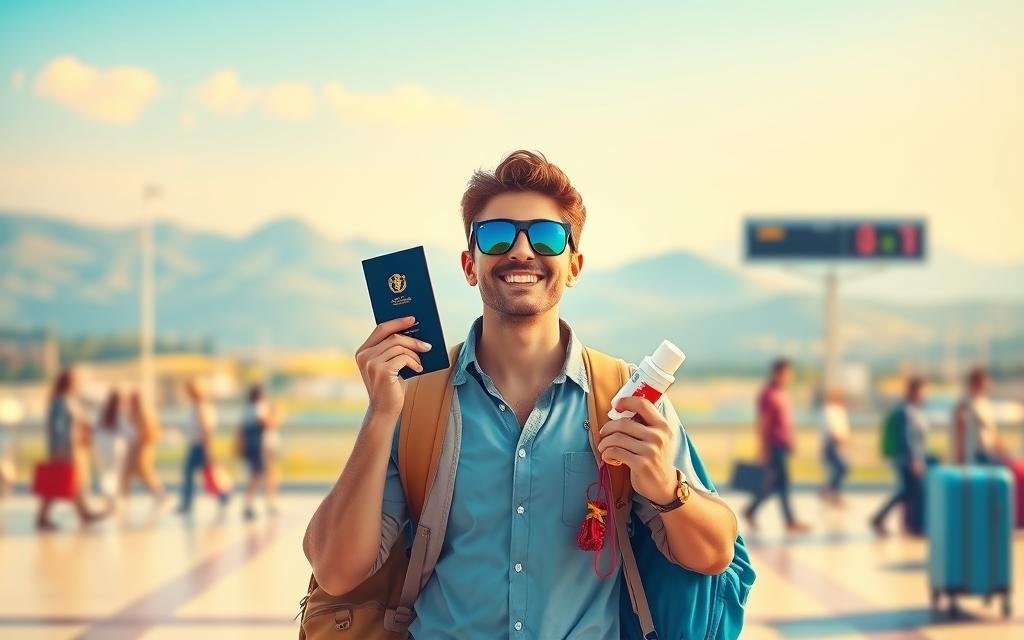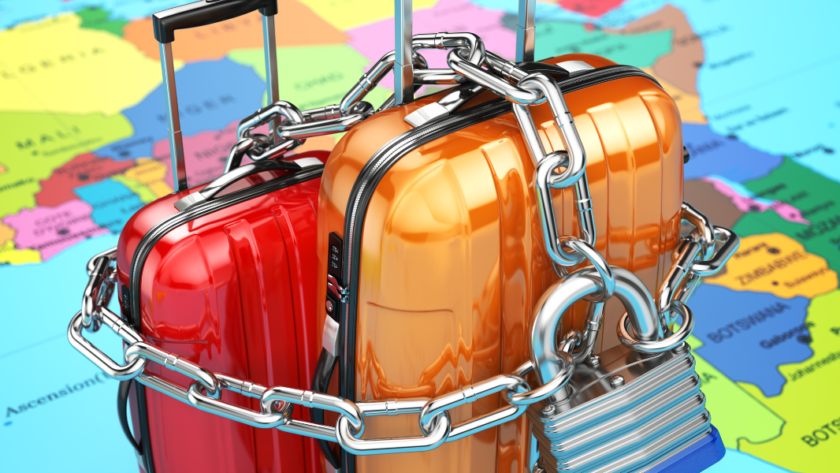Planning a trip is exciting and full of discoveries and cultures. But keeping safe while traveling is key. Knowing travel safety tips is vital. This article will give you the essential travel safety advice to stay safe and enjoy your trip.
We’ll cover everything from pre-trip prep to staying alert on the move. We’ll also discuss handling emergencies. A well-informed traveler is a safe traveler. Let’s explore important safety practices and precautions together.
Key Takeaways
- Register your travel plans with the Smart Traveler Enrollment Program (STEP) to stay informed about safety conditions.
- Carry a first-aid kit and necessary medications; be aware of local healthcare facilities.
- Avoid walking alone in poorly lit or isolated areas, and stay vigilant of your surroundings.
- Use secure ATMs and keep an eye on your surroundings when withdrawing money.
- Inform a trusted friend or family member about your travel plans and update them on your location.
- Use transportation apps to book rideshare services with someone you trust.
- Dress modestly and avoid drawing attention to yourself to blend in and stay safe.
Understanding the Importance of Travel Safety
Traveling safely is more than just booking your trip. It is about following travel safety precautions to avoid trouble. Using top travel safety tips, you can enjoy your journey without stress.
Why Safety Should Be a Priority
Traveling is full of surprises. You might face new places and cultures that can be risky. Knowing local customs and dressing right can help you avoid trouble.
Choosing safe transport over hitchhiking or crowded buses can protect you from theft and violence. Being careful in congested areas can also keep you safe from pickpockets.
The Impact of Travel Insurance
Travel insurance is more than just a backup plan. It covers emergencies like medical costs, trip cancellations, and lost items. By registering with the Smart Traveler Enrollment Program (STEP), you get essential health and safety updates.
This ensures you’re ready for anything. Good insurance can make you feel more confident and secure on your travels.
Assessing Your Risk
Everyone’s risk level is different. Your health, where you’re going, and what you plan to do all play a part. Some places might have health risks, like waterborne diseases, while others might be more dangerous.
Understanding these risks helps you take steps to stay safe. Using GPS and telling friends your plans can also help keep you safe.
Preparing for Your Trip
Getting ready for your trip is very important for your safety. Here are some key tips to help you prepare.
Researching Your Destination
It’s important to research your destination well. Check the State Department’s website for information on your destination. Also, sign up for the Smart Traveler Enrollment Program (STEP) for safety updates.
Get emergency contact info for embassies and local authorities. This is useful in case of any problems.
Understanding Local Laws and Customs
Knowing the laws and customs of your destination is key. Dress in a way that doesn’t attract attention, wear protective clothing, and carry important documents like your passport.
Knowing the local laws helps you avoid trouble. It also makes sure you are respectful of the culture.
Creating a Packing Checklist
Make a detailed packing list to improve your trip. Share your travel plans with friends and family. Stay in touch regularly. To keep your information safe, use a VPN when using public Wi-Fe. Lock your hotel room well for security. Use travel locks for your luggage.
Pack a bag that’s safe from pickpockets. Keep digital copies of important documents like your passport. This way, you have backups if something gets lost or stolen.
To stay safe, use trusted taxi services or apps like Uber. Download safety apps for alerts and emergency information. Save important numbers, like your embassy’s, on your phone.
Staying Safe During Your Journey
Keeping yourself safe while traveling is key to a worry-free trip. You can enjoy your journey without worrying about risks by following safe travel practices.
Tips for Air Travel Safety
Traveling by air safely means being ready and alert. Make sure you:
- Drink water and avoid too much caffeine and alcohol.
- Wear a face mask in crowded places or on public transport.
- Watch your alcohol intake and be careful of unknown ingredients in food or drinks.
- Use hand sanitizer with at least 60% alcohol, like Purell.
Precautions for Road Trips
For a safe road trip, follow these essential tips:
- Look up trusted taxis and ridesharing ridesharing your destination. Know their payment methods and customer service.
- Learn about local landmarks, remember your lolodging’sddress, or write it down in the local language.
- Have local emergency numbers ready and easily accessible.
- For motion sickness, use Dramamine or acupressure bands an hour before traveling.
Keeping Your Belongings Secure
Keeping your belongings safe is a must for safe travel:
| Item | Security Tip |
|---|---|
| Valuables | Store them in a hotel safe to avoid theft. |
| Phone and Wallet | Carry them in front pockets to prevent pickpocketing. |
| Luggage | Please keep it in sight or secure it properly. |
Using these safe travel tips can improve your trip while keeping you safe. Being ready and careful ensures an incredible journey.
Navigating New Environments
Starting in a new place can be thrilling and scary at the same time. But by following safe travel practices, your trips can be fun and safe. Here are some key tips to remember when exploring new places.
Staying Aware of Your Surroundings
Being aware of your surroundings is a top safety tip. Always keep an eye out, even in places you don’t know well. Listen to your gut and leave if something doesn’t feel right. Learn about safe and unsafe areas and how to spot scams.
Using Technology for Safety
Technology can help keep you safe while traveling. Use good navigation apps that work offline. Keep your devices charged and use GPS. Tell a friend where you are and what you’re doing. But don’t spend too much time on social media to stay safe.
Asking Locals for Advice
Local advice is super helpful in new places. Ask people who live there about safe spots and how to get around. They know things that books don’t, but they share too much about themselves. Keep a balance between curiosity and caution.
Accommodation Safety Measures
When planning your trip, focus on safety. Thorough research is vital. It helps ensure you stay safe while traveling.
Choosing a Safe Place to Stay
Start by researching where you’ll stay. Read reviews on sites like TripAdvisor and Google Maps. For better safety, pick a place near public transport and services.
Look for hotels with 24-hour reception and strong security. This will give you peace of mind.
Hotel Safety Tips
Check your room’s safety features as soon as you arrive. Make sure locks work, test emergency phones, and watch for hidden cameras. Your room should also have safety devices like carbon monoxide detectors and fire alarms.
Choose a room on a higher floor, like the third to sixth. This is safer. Keep your room key separate from the packet to hide your room number. Know the emergency exit and read the emergency plan in your room.
Trust Your Instincts
Staying safe isn’t just about physical steps; it’s also about trusting your gut. If something doesn’t feel right, change your plans or ask for a different room. Always have a backup plan for where to stay. Book online to avoid sharing personal info at the desk.
Transportation Safety Tips
Traveling can be challenging, but you can stay safe with the right expert travel safety tips. Whether you’re using public transport, ridesharing, or ridesharing ridesharing, following safety precautions is essential. Here are some ways to keep safe while traveling.
Using Public Transportation Wisely
Plan your public transport trip well in advance. Know the exact times, locations, and fare costs. Tell a family member, friend, or coworker about your travel plans and check in with them when you arrive.
Sit in an aisle seat to stay alert and avoid sitting near doors to prevent theft. Keep your belongings close to you to avoid loss. Do not show off expensive items to avoid attracting thieves. Trust your instincts, move to a safer spot, or alert the driver if you feel uneasy.
Ridesharing Ridesharingices
Ridesharing Is convenient but requires safety awareness. Always check the license plate and driver details on your app before getting in. Sit in the back seat and wear your seat belt for safety. Avoid drivers who seem drunk, tired, or odd.
Share your ride details with someone you trust and track your trip on the app. This way, you can stay safe and connected.
Avoiding Common Transportation Scams
Scams can ruin your trip. Use licensed cabs and check fares in advance. In some places, be careful of crowded or unsafe public transport. Always choose the safest travel option.

To stay safe, avoid traveling at night in risky areas. Be careful at intersections, as they are hotspots for accidents. Know about local holidays and seasonal hazards like floods or snowstorms affecting roads.
| Tip | Action |
|---|---|
| Plan Ahead | Know the exact times, locations, and money needed for fares |
| Inform Contact | Inform a family member or friend about your route and schedule |
| Sit Safely | Sit in an aisle seat and keep belongings close |
| Verify Rideshare | ChecRideshareense plate and drdriver’setails |
| Avoid Suspicious Drivers | Never ride with drivers who seem intoxicated or irrational |
| Prearrange Rides | Use reputable services to avoid scams |
| Seasonal Awareness | Be mindful of hazards like floods or snowstorms |
Staying Connected
Staying connected is key to travel safety. It gives you and your family peace of mind. Follow these tips to stay in touch and safe.
Sharing Your Itinerary
Sharing your travel plans with someone you trust is a must. This way, they always know where you are. Use apps to track your location and download maps for your online presence.
Importance of a Reliable Communication Plan
A good communication plan involves more than just talking. For safety, use international mobile services and register with your embassy. Make sure your phone can be found if lost, and keep your devices updated to avoid cyber threats.
Use secure Wi-Fi and VPNs when using public networks. Do not share personal information online, and turn off location services when necessary. This will keep your information safe.
Utilizing Emergency Services
Knowing how to reach emergency services is essential. Learn local emergency numbers and procedures. Tell your credit card companies about your travel and keep crucial documents online for easy access. With a solid plan, you can enjoy your trip while staying safe.
Health and Safety Considerations
Traveling safely means planning and following essential health tips. Here are some key safety measures to remember when preparing for your trip.
Packing a Travel Health Kit
Do not forget to pack a travel health kit. It should include your regular medicines, any prescription drugs, and their copies. Also, include basic first-aid items like antiseptics, pain relievers, hand sanitizer, and face masks.
It’s also vital to check if your medications are legal in your destination country. This can help avoid any legal issues.

- Prescriptions and medications
- Bandages and antiseptics
- Pain relievers like aspirin or ibuprofen
- Hand sanitizer and sanitizing wipes
- Face masks
- Insect repellent
- Sunscreen
- Contact lens solutions (if applicable)
Understanding Destination Health Risks
Learn about health risks in your travel destination. This is a critical safety step. Check if you need any vaccinations, like for hepatitis A/B, typhoid, or yellow fever.
Find out about local health services, including hospitals, clinics, and pharmacies. Sign up for health alerts from your government and register with their travel program. Keep a list of emergency contacts, including the nearest embassy or consulate.
| Item | Details |
|---|---|
| Vaccinations | Hepatitis A/B, typhoid, yellow fever |
| Medications | Prescription drugs, legality in destination country |
| Local Health Services | Hospitals, clinics, pharmacies |
| Emergency Contacts | Local emergency services, embassy/consulate |
Staying Hydrated and Healthy on the Go
Travel can disrupt your routine, but staying hydrated and healthy is key. Drink safe water, avoid ice, and choose well-cooked foods. These steps are simple but effective.
To avoid illnesses, be careful with food and water. Use insect repellents and wear protective clothes in areas with diseases like malaria and dengue. Avoid swimming in fresh water in regions with parasites.
Following these tips can reduce health risks and make your trip safer. Always stay informed and ready for any health emergencies.
Cultural Sensitivity and Safety
Traveling well means knowing and respecting the cultures you meet. Being culturally sensitive leads to better interactions and keeps you safe. This part covers respecting local customs, grasping cultural norms, and crossing language gaps for a safer, more rewarding trip.
Respecting Local Customs
Before you go, learn about the local customs and traditions. This helps avoid unintentional disrespect. For example, check the dress code and photo rules at religious sites. Doing so shows respect and builds goodwill.
Also, choose to support local businesses over tourist spots. This helps create positive connections, which can be very useful.
Understanding Cultural Norms
Knowing the local cultural norms and laws is key. Food and diet rules can affect your health and connection with local people. Avoid drawing attention, like wearing flashy jewelry.
Nonverbal signals differ across cultures. Being aware of these can prevent misunderstandings.
Bridging Language Barriers
Language differences can be challenging, but learning a few local phrases helps. It shows respect and makes talking easier. Knowing how locals handle emergencies and health issues prepares you for the unexpected.
Stay away from sensitive topics like religion or politics. These can lead to awkward or complicated situations.
Following these safety tips will make your trip safer and more enjoyable. Respecting local customs, understanding cultural norms, and overcoming language barriers will enrich your journey while keeping you safe and respectful.




